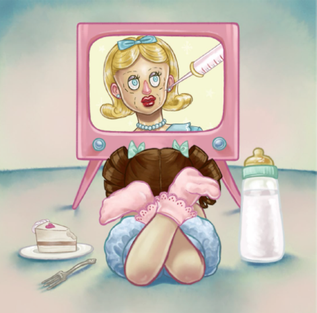Ever since its invention, plastic surgery has always been stigmatized in society, especially in Asian countries. Young girls and boys look toward impossible standards in beauty and their impressionable, innocent minds are molded to believe that anything outside of those standards is undesirable. When they achieve those standards, in a way ‘cheating’ the system, society proceeds to refuse them. It’s a paradox, and there’s no winning, except to just accept that plastic surgery should be normalized and healthy.
But it’s never really that simple; because if it were, we wouldn’t be discussing this.
Progressive thinkers have tried to justify plastic surgery on their own terms—but in my eyes, it can never be considered ‘progressive’. According to the Oxford dictionary, to be ‘progressive’ is to be ‘an advocate of social reform’; to be progressive would be to create change, to demolish a system that no longer benefits us.

Before we explore how plastic surgery isn’t progressive, let’s talk about why people want it in the first place. Growing up, unrealistic beauty standards through photoshopped images, fake diets and painful smiles have been all but plastered in front of our faces. Every time we see these images, we wish we could be them. The phrase ‘no beauty without pain’ is constantly repeated to us, whispered into our ears until it’s engraved into our brains. All this would not be so harmful if we just knew it was fake. We grew up thinking Kylie Jenner’s body was naturally achieved; influencers like her, especially ones with a vast platform and impact on teenagers, have a responsibility to their audience. If you know you hold a certain amount of clout, you are responsible for the messages conveyed to your following—yet most of the time, these influencers are not aware that their message is not always a positive one.
The media advertises these bodies as if they are real and easily achievable, feeding into the notion that, for both men and women, a certain body type is the most desirable, and anything short of that is labeled ‘unwanted’. No wonder we need it so badly—everyone wants to be wanted. Plastic surgery contributes to the system of impossible beauty archetypes upheld by white supremacist Eurocentric standards—it is just adding fuel to the flame.
What I find controversial and contradictory about some ‘progressive’ liberals’ arguments in favor of cosmetic surgery is that they parade it as an act of body positivity and moving away from beauty standards. Verywell Mind defines body positivity as ‘the assertion that all people deserve to have a positive body image, regardless of how society and popular culture view ideal appearance.’ It is defined as ‘challenging how society views the body’. We cannot challenge how society views the body while also conforming to its demands; we cannot accept our bodies while also wanting to change them.
According to Stanford Healthcare, the most common types of procedures done pertaining to plastic surgery are breast augmentation; chin, cheek, or jaw reshaping; liposuction; and nose reshaping. Most if not all of these procedures are done to adhere to the beauty standard—the one upheld by Eurocentrism.
People with prominent nose bridges, known as aquiline noses, get surgery to flatten them because according to the beauty standard, that is what’s ‘beautiful’. Women get breast augmentations because society, or more specifically men and the patriarchy, tell them that that’s what they want to see. Sure, the idea of men or others who uphold the Eurocentric beauty standard hating women who get plastic surgery is paradoxical and ultimately rooted in misogyny, but wanting to change yourself to adhere to a certain standard isn’t necessarily progressive either.
Plastic surgery can never be progressive because it is simply just conforming to an old standard. Is progressiveness not refusing a hierarchy that’s no longer needed? Dismantling an outdated system, which in this case contributes to white and male supremacy? We cannot expect to deconstruct a backward system when we still obey it. We cannot be advocates of body positivity when what we’re saying is basically ‘it’s okay to change how your body looks because society says it’s ugly’.
If we as a society continue to advertise that plastic surgery is somewhat acceptable, more people—especially teenagers with impressionable minds—will continue to dislike their bodies and be willing to undergo drastic changes to submit to the beauty standard. For us to be truly progressive, we must discard the old, inherently racist, and misogynistic system that is the societal beauty standard, and learn to accept ourselves rather than change it for others.